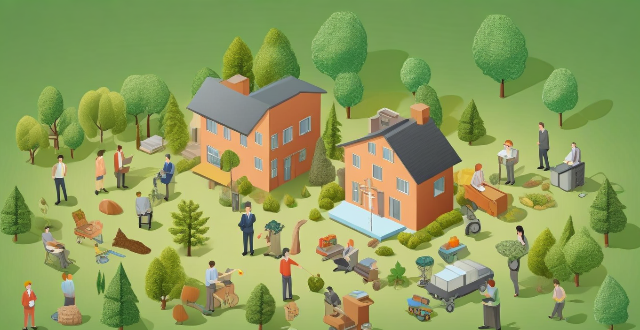Sustainable development is a concept that aims to meet the needs of the present without compromising future generations' ability to meet their own needs. It is crucial for addressing poverty, inequality, climate change, and environmental degradation. Sustainable development promotes economic growth, social inclusion, and environmental protection. It encourages renewable energy use, sustainable agriculture, and green technologies to create job opportunities and reduce unemployment. By ensuring access to basic services, it helps reduce poverty and improve living standards for all segments of society. Promoting gender equality is an integral part of sustainable development. It also focuses on reducing greenhouse gas emissions, adapting to climate change, conserving forests, protecting biodiversity and natural resources, controlling pollution, preventing conflicts over resources, aiding in post-conflict recovery, and reducing disaster risks. Sustainable development offers a framework for addressing complex global challenges while ensuring long-term ecological sustainability.

What is Sustainable Development?
Sustainable development is a multidimensional concept that aims to meet the needs of the present without compromising the ability of future generations to meet their own needs. It involves a balance between economic growth, social inclusion, and environmental protection. The idea of sustainable development gained prominence with the publication of the Brundtland Report in 1987, which defined it as "development that meets the needs of the present without compromising the ability of future generations to meet their own needs."
Why is Sustainable Development Important?
The importance of sustainable development lies in its potential to address some of the most pressing issues facing humanity today, including poverty, inequality, climate change, and environmental degradation. Here are some key reasons why sustainable development is crucial:
1. Addressing Poverty and Inequality
- Economic Growth: Sustainable development promotes economic growth by fostering innovation and investment in renewable energy, green technologies, and sustainable agriculture. This can create new job opportunities and reduce unemployment, particularly in developing countries.
- Social Inclusion: By ensuring access to basic services such as education, healthcare, and clean water, sustainable development helps to reduce poverty and improve living standards for all segments of society.
- Gender Equality: Promoting gender equality is an integral part of sustainable development, as it ensures that women and girls have equal opportunities to participate in economic, social, and political activities.
2. Combating Climate Change
- Reducing Greenhouse Gas Emissions: Sustainable development encourages the use of renewable energy sources and energy-efficient technologies, which can help reduce greenhouse gas emissions and mitigate the effects of climate change.
- Adaptation to Climate Change: By promoting resilient infrastructure and sustainable land use practices, sustainable development helps communities adapt to the impacts of climate change, such as floods, droughts, and storms.
- Forest Conservation: Sustainable development also emphasizes the conservation of forests, which act as carbon sinks and play a vital role in maintaining ecological balance.
3. Protecting Biodiversity and Natural Resources
- Conservation of Ecosystems: Sustainable development promotes the conservation of ecosystems and biodiversity by encouraging sustainable land use practices, such as agroforestry and ecotourism.
- Sustainable Use of Natural Resources: By promoting the efficient use of natural resources, sustainable development helps ensure that these resources are available for future generations.
- Pollution Control: Sustainable development also focuses on reducing pollution levels by promoting cleaner production methods and waste management strategies.
4. Promoting Peace and Security
- Conflict Prevention: Sustainable development can help prevent conflicts over resources by promoting cooperation and shared management of natural resources among different communities.
- Post-Conflict Recovery: In post-conflict situations, sustainable development can aid in rebuilding shattered communities by providing employment opportunities, restoring infrastructure, and promoting social cohesion.
- Disaster Risk Reduction: By strengthening community resilience and preparedness, sustainable development contributes to disaster risk reduction efforts, ultimately enhancing peace and security.
In conclusion, sustainable development is essential for creating a more equitable, prosperous, and secure world for current and future generations. It offers a framework for addressing complex global challenges while ensuring long-term ecological sustainability.